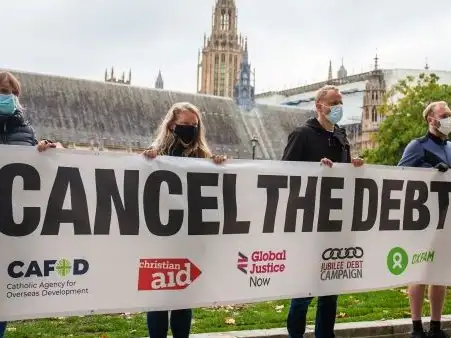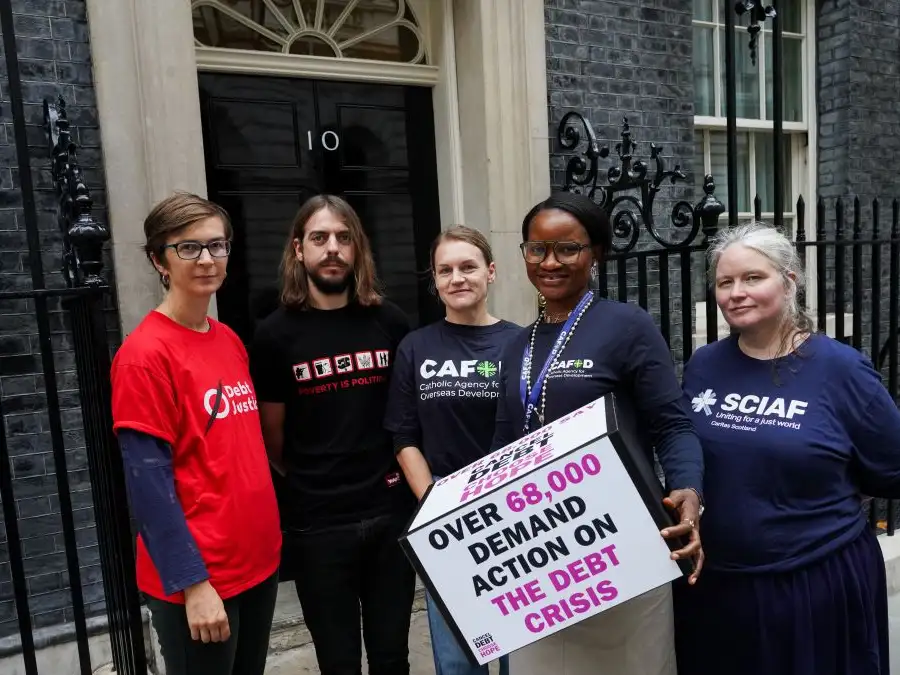


Campaigners on Parliament Square call for Chancellor Rishi Sunak to cancel all debts owed by developing countries in light of the disastrous impacts of the coronavirus pandemic.
This briefing aims to shine a light on the debt owed to private creditors by five African countries - Ghana, Kenya, Nigeria, Senegal and Zambia - and outlines the steps which the G20 needs to take immediately to avert further economic chaos.
It highlights the central role of enormous financial corporations like BlackRock, HSBC, Goldman Sachs, Legal & General, JP Morgan and UBS, which have become increasingly important in the world of sovereign debt.
Summary
The G20 must step in and compel private creditors to cancel the debts of developing countries to avoid the loss of many more lives. In the global south, coronavirus is leaving a trail of devastation - from widespread loss of life from the virus itself, to huge economic disruption that has left hundreds of millions of people, who were already struggling to make ends meet, without jobs or sufficient food.
Despite this huge economic shock, many developing countries are continuing to pay off debts to rich countries, public institutions like the World Bank and IMF, and some of the richest banks and hedge funds in the world. This means they have less money to meet the immediate needs of the population.
Private creditors’ share of the foreign debts of low- and lower-middle income governments increased from 25% in 2010 to 47% in 2018. It is clear that a voluntary approach has not and will not work. Since April, the G20 has called on private creditors to voluntarily suspend some debt payments. That has still not happened, leading World Bank President David Malpass to remark in early October, “these investors are not doing enough and I am disappointed with them.”
Private sector debt is shrouded in secrecy and complexity, with no comprehensive or independent mechanism for reviewing or writing this debt down. This gives private creditors enormous power over developing countries. An independent space is urgently needed where developing countries can negotiate comprehensive, swift and orderly restructurings, allowing governments to respond to the consequences of Covid-19.
Without urgent reform to the one-sided debt system, the economic crisis will be exacerbated further, leading to unnecessary loss of life and livelihoods.
Key recommendations
Ahead of the October 2020 G20 finance ministers' meeting we call for urgent action. The G20 should:
Use all legal, political and financial mechanisms available to compel private creditors to suspend debt payments and write-down developing country debts
Jumpstart a process to create an international debt workout mechanism that allows for comprehensive debt restructurings. This mechanism must be independent of creditors, rapid and fair, assigning priority to developing governments' primary responsibility for the welfare of their people.
CAFOD's policy team provides briefings, reports and research on our advocacy and lobbying work, plus materials to support our campaigns.
We are facing the most acute global debt crisis in history and it's the world's poorest countries who are the worst affected.



